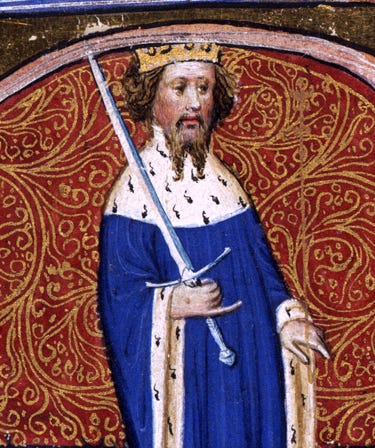FINALLY! Owain Glyndŵr hits the big stage!
From Wales to the World, thanks to our own national deliverer, Michael Sheen
FINALLY! Owain Glyndŵr hits the big stage!
I read the news with great excitement this week. We are finally getting as representation of Owain Glyndŵr on the big stage brought to us by a modern national deliverer!
I have long lamented and decried that lack of attention Welsh history has received when it comes to mining our deep and complex past for the big stage or screen, often casting my eyes enviously towards the other Home Nations for how well they’ve been able to explore and exploit their national stories.
England has had glorious films like Elizabeth and The King’s Speech or compelling drama like The Crown, whilst Ireland and Scotland haven’t fared too badly either in Hollywood - I’m thinking of productions like Michael Collins, The Wind That Shakes the Barley, Rob Roy, Mary Queen of Scots and, of course, Braveheart. Each was a quasi-fictional portrayal of a moment in those countries national stories that exposed the history to wide audiences, fuelling one would hope an upsurge in students keen to explore the past further.
Wales, as often is sadly the case in many ways, has fallen behind, or rather, has been left behind. We’ve had a few shining lights, like Pride, set partly in the heart of a South Welsh mining pit, but I can’t think of much else when it comes to exploring our rich and vibrant history, a history rife with stories to tell.
When the National Theatre Wales fell victim to crippling austerity cuts and ceased to exist in 2024, threatening our nation’s proud track record of producing talented actors and playwrights, often from less advantaged backgrounds, there was deep concern that Welsh stories would be further limited in reaching audiences going forth.
Fortunately, a hardy champion stepped forward in the incomparable Michael Sheen, beloved by his audiences for his work but who has also been deeply embraced by his people in recent years. Sheen announced a few years ago that he was founding a new theatre company named the Welsh National Theatre which would have “Welsh theatre makers, Welsh stories and Welsh actors” at its heart. From Wales to the World is an excellent motto for this venture.
Conscious of the lack of opportunities out there for Welsh youth, Sheen is also looking to establish what he has termed ‘The Welsh Net’, a network of scouts across Wales which will identify and nurture young artistic talent that can be developed into tomorrow’s professionals and guided towards creative pathways for success that aren’t currently being presented. The name is derived from the detestable Welsh Not, a Victorian education device employed in Wales, often by Welsh teachers and parents rather than the English educational system as is often erroneously believed, to stifle the Welsh language and smother creativity and expression through the sole medium of Welsh. The Welsh Net, then, looks to raise up Wales and the Welsh.
And Sheen’s proven as good as his word with announcement of the WNT’s first productions hitting the press this week. Finally, after what seems an interminable and unfathomable wait, the story of Owain Glyndŵr is finally going to be told! And my, is it a story that needs and deserves to be told.
According to a series of press releases and subsequent reporting, in 2026 Sheen and his Welsh National Theatre venture will produce ‘Owain & Henry’, a blank verse exploration of the relationship and struggle between Glyndŵr and Henry IV of England. It is something briefly covered by Shakespeare in his renowned play Henry IV Part 1 of course, but this promises to be a more sympathetic (and less weird) portrayal of the Welshman, written by Gary Owen and played perhaps fittingly by Sheen himself.
As reported by The Guardian, Sheen said: “The Owain that Gary has written is incredibly pragmatic, very real, dealing with the really difficult and sometimes disturbing choices a leader has to make,” adding “The play is brutal at times, it’s funny, subversive, challenging, controversial. When I first read it, I got to about five scenes in and thought, it can’t keep up like this but it does.”
As readers of my book ‘Son of Prophecy’ will know, I cover Owain Glyndwr’s emergence as a Welsh national leader closely, following his tumultuous journey as he strives to liberate the Welsh people from the English fist which has engulfed them for the previous century and more. It is a subject I have also shed a light on during my book tour across the last year, and have been encouraged by the response of the primarily English audiences I speak to about this titan of Wales’s story.
Glyndŵr was, unquestionably, a complex figure, who by 1400 was an aging man imbued with a deep sense of his past, an uncomfortable anxiety about his present, and burdened by the possible. A scion of no less than three royal Welsh houses, he had spent most of his life a Welsh lord comfortable in English social circles, very much presenting as a dutiful subject of the English crown – he served in the king of England’s armies several times, for example.
But things weren’t comfortable for the Welsh at large, a people disenfranchised after their country was conquered by their English neighbour. They fostered a scarcely hidden resentment at English rule, frustrated by what they viewed was misgovernance, extortion and corruption, with English officials exploiting the Welsh for personal gain. Welsh hostility fed English fears, whilst English suppression galvanised Welsh spirits, creating an increasingly toxic climate of mutual suspicion which threatened to explode into open revolt at any moment.
When Glyndŵr began falling foul of the new King of England Henry IV at the end of 1399, the call of his people to lead them proved compelling. He was increasingly alienated and provoked by a dismissive English government, and pressed into a corner, choose an explosive route.
On 16 September 1400, surrounded by his kinsmen, family and friends, Glyndŵr raised the banner of revolt, declared himself Prince of Wales, and went to work, torching several English towns in Wales and embarking on a decade-long campaign to liberate the Welsh from English servitude. During the crusade, he held Welsh parliaments, sought foreign recognition of his claim, led armies to resounding victories, and developed a remarkable far-reaching national manifesto with a vision that included ambitions to establish Welsh universities and reinstate Welsh law once statehood was achieved. For good reason, he was lauded by the bards of his day as ‘the sole head of the Welsh’.
Glyndŵr’s revolt would, in the end, grind to a halt, undone by lack of military or financial resources, and then gradually lose ground, until very few were left standing. At an unknown date, he disappeared into the mountains which for so long had protected him from English traps, and never reappeared. We know not what became of this enigmatic leader who for so long had King Henry of England on the backfoot.
Today, he is shrouded in myth, reinvented to represent various political ideologies of those who have raised him to somewhat messianic status, the father of modern Welsh nationalism even. His defiance inspires today, and there are plenty of statues and memorials to him across the nation. There was much more to Glyndŵr, however, a complex husband, father, and son who was driven to rebellion for personal vengeance and ambition as much as mere patriotic ideals. A remarkable man who had the mighty King Henry of England on the ropes for quite some time, we can hope the personal will be explored as much as the political.
We must not forget the other party involved here, though, Henry IV – himself a dynamic, impressive figure who was one of the finest noblemen England had produced for quite some time, a man imbued with the chivalric ideal who spent much of his youth travelling the known world, even embarking on crusade. When his cousin Richard II effectively broke the oath he had sworn to uphold to his subjects, Henry did the unthinkable and deposed then murdered Richard, an anointed king, and took his place. His reign was far from easy, beset from debilitating illness, anxious about his status as a usurper, a kingdom fractured by internal rivalries and revolts, and, of course, forced to deal with the problematic matter of the Welsh uprising.
Michael Sheen is a beloved figure within Wales today, lauded by many (including me) for his common-sense outlook on myriad political and cultural topics, undaunted by going against the wider grain to convey the sentiments many within the communities he was reared share. If there is anyone capable of bearing the burden of Glyndŵr and presenting this intrepid and enigmatic Prince of Wales to a diverse 21st Century audience, then it will be Sheen. They seem a perfect match, and Sheen is well positioned to enthusiastically receive the mantle of national deliverer (of the arts, at least, and perhaps one day more?) and to drive Wales forward in the face of overwhelming odds.
When launching the Welsh National Theatre, Sheen mused “I think if you put that on with ambition and audacity, with creativity and innovation, then people will respond to it” – he could have been talking about Glyndŵr himself.
Suffice to say, as someone who has written about both Owain Glyndŵr and Henry IV in various works, and who has come to admire both men’s resourcefulness and resilience, I am CHOMPING AT THE BIT to learn more about what Sheen, Owen and the Welsh National Theatre have planned.
I look forward to being first in line for tickets. Oh, and this will finally condemn that ridiculous Shakespearean phonetic anglicisation ‘Owen Glendower’ to the past – he’s Owain Glyndŵr, got it?
Here is a taste of Michael at his most passionate and Welsh, attempting to inspire the Welsh football team a few years back.
Son of Prophecy
'Son of Prophecy: The Rise of Henry Tudor' is a 300-year history of one Welsh family, and how they emerged from the wilds of Gwynedd, navigated the murky and violent waters of Welsh-Anglo politics, and eventually found their way, almost improbably, onto the English throne. This story involves war, treason, escapes and love.
Fourteen years in the making, from defiant Welsh rebels to unlikely English kings, this is the story of the Tudors, but not how you know it. A BBC History Magazine 2024 Book of the Year, it is available to buy worldwide now HERE










This is great news! Can’t wait to see the play come to fruition!
What great news! Sheen is indeed a hero of the hour:)